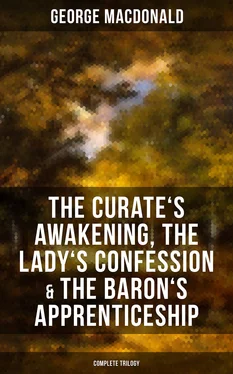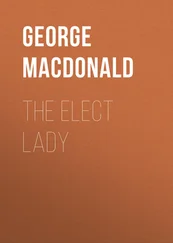"Would you mind walking up stairs for a few minutes, sir? I ask it as a great favour. I want very much to speak to you."
"I shall be most happy," answered Wingfold—conventionally, it must be allowed, for in reality he anticipated expostulation, and having in his public ministrations to do his duty against his own grain, he had no fancy for encountering other people's grain as well in private. Mr. Drew opened certain straits in the counter, and the curate followed him through them, then through a door, up a stair, and into a comfortable dining-room, which smelt strongly of tobacco. There Mr. Drew placed for him a chair, and seated himself in front of him.
The linen-draper was a middle-aged, middle-sized, stoutish man, with plump rosy cheeks, keen black eyes, and features of the not uncommon pug-type, ennobled and harmonized by a genuine expression of kindly good-humour, and an excellent forehead. His dark hair was a little streaked with gray. His manner, which, in the shop, had been of the shop, that is, more deferential and would-be pleasing than Wingfold liked, settled as he took his seat into one more resembling that of a country gentleman. It was courteous and friendly, but clouded with a little anxiety.
An uncomfortable pause following, Wingfold stumbled in with the question, "I hope Mrs. Drew is well," without reflecting whether he had really ever heard of a Mrs. Drew.
The draper's face flushed.
"It is twenty years since I lost her, sir," he returned. In his tone and manner there was something peculiar.
"I beg your pardon," said Wingfold, with self-accusing sincerity.
"I will be open with you sir," continued his host: "she left me—with another—nearly twenty years ago."
"I am ashamed of my inadvertence," rejoined Wingfold. "I have been such a short time here, and—"
"Do not mention it, sir. How could you help it? Besides, it was not here the thing took place, but a hundred miles away. I hope I should before long have referred to the fact myself. But now I desire, if you will allow me, to speak of something different."
"I am at your service," answered Wingfold.
"Thank you, sir.—I was in your church last Sunday," resumed the draper after a pause. "I am not one of your regular hearers, sir; but your sermon that day set me thinking, and instead of thinking less when Monday came, I have been thinking more and more ever since; and when I saw you in the shop, I could not resist the sudden desire to speak to you. If you have time, sir, I hope you will allow me to come to the point my own way?"
Wingfold assured him that his time was at his own disposal, and could not be better occupied. Mr. Drew thanked him and went on.
"Your sermon, I must confess, sir, made me uncomfortable—no fault of yours, sir—all my own—though how much the fault is, I hardly know: use and custom are hard upon a man, sir, and you would have a man go by other laws than those of the world he lives in. The earth is the Lord's and the fulness thereof—you will doubtless say. That is over the Royal Exchange in London, I think; but it is not the laws of the Lord that are specially followed inside for all that. However, it is not with other people we have to do, but with ourselves—as you will say. Well then it is for myself I am troubled now. Mr. Wingfold, sir, I am not altogether at ease in my own mind as to the way I have made my money—what little money I have—no great sum, but enough to retire upon when I please. I would not have you think me worse than I am, but I am sincerely desirous of knowing what you would have me do."
"My dear sir," returned Wingfold, "I am the very last to look to for enlightenment. I am as ignorant of business as any child. I am not aware that I ever bought anything except books and clothes, or ever sold anything except a knife to a schoolfellow. I had bought it the day before for half-a-crown, but there was a spot of rust on one of the blades, and therefore I parted with it for twopence. The only thing I can say is: if you have been in the way of doing anything you are no longer satisfied with, don't do it any more."
"But just there comes my need of help. You must do something with your business, and DON'T DO IT, don't tell me what to do. Mind I do not confess to having done anything the trade would count inadmissible, or which is not done in the largest establishments. What I now make a question of I learned in one of the most respectable of London houses."
"You imply that a man in your line who would not do certain things the doing of which has contributed to the making of your fortune, would by the ordinary dealer be regarded as Quixotic?"
"He would; but that there may be such men I am bound to allow, for here am I wishing with all my heart that I had never done them. Right gladly would I give up the money I have made by them to be rid of them. I am unhappy about it. But I should never have dared to confess it to you, sir, or, I believe, to anyone, but for the confession you made in the pulpit some time ago. I was not there, but I heard of it. I foolishly judged you unwise to accuse yourself before an unsympathizing public—but here am I in consequence accusing myself to you!"
"To no unsympathising hearer, though," said the curate.
"It made me want to go and hear you preach," pursued the draper; "for no one could say but it was plucky—and we all like pluck, sir," he added, with a laugh that puckered his face, showed the whitest of teeth, and swept every sign of trouble from the half-globe of his radiant countenance.
"Then you know sum and substance of what I can do for you, Mr. Drew: I can sympathize with you;—not a whit more or less am I capable of. I am the merest beginner and dabbler in doing right myself, and have more need to ask you to teach me than to set up for teaching you."
"That's the beauty of you!—excuse me, sir," cried the draper triumphantly. "You don't pretend to teach us anything, but you make us so uncomfortable that we go about ever after asking ourselves what we ought to do. Till last Sunday, I had always looked upon myself as an honest man: let me see: it would be more correct to say I looked on myself as a man QUITE HONEST ENOUGH. That I do not feel so now, is your doing, sir. You said in your sermon last Sunday, and specially to business men: 'Do you do to your neighbour as you would have your neighbour do to you? If not, how can you suppose that the lord of Christians will acknowledge you as a disciple of his, that is, as a Christian?' Now I was even surer of being a Christian than of being an honest man. You will hardly believe it, and what to think of it myself I now hardly know, but I had satisfied myself, more or less, that I had gone through all the necessary stages of being born again, and it is now many years since I was received into a Christian church—dissenting of course, I mean; for what I count the most important difference after all between church and dissent is that the one, right or wrong, requires for communion a personal profession of faith, and credible proof of conversion—which I believed I gave them, and have been for years, I shame to say it, one of the deacons of that community. But it shall not be for long. To return to my story, however: I was indignant at being called upon from a church-pulpit to raise in myself the question whether or not I was a Christian;—for had I not put my faith in the—? But I will avoid theology, for I have paid more regard to that than has proved good for me. Suffice it to say that I was now driven from the tests of the theologians to try myself by the words of the Master: he must be the best theologian after all, mustn't he, sir?—and so there and then I tried the test of doing to your neighbour AS. But I could NOT get it to work; I could not see how to use it, and while I was trying how to make it apply, you were gone, and I lost all the rest of the sermon.
Читать дальше












